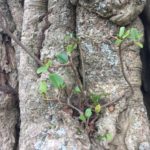Lenana was a well-known Laibon (oloiboni, “ritual expert”) of the Maasai, b. sometime between 1860 and 1870 (he was circumcised in 1882, perhaps at the age of nineteen? … traditionally, Maasai did not keep track of their birthdates, but only of when they were circumcized) and dying in 1911. The name Lenana means “of the gentleness.” An important Maasai leader during the colonialization of East Africa by Great Britain, he is better known among the Maasai themselves by the other form of his name, Olonana (“he of gentleness”).
Lenana is a fairly common Maasai boy’s name. I’ve not heard (though I don’t know everything) of anyone else named Ololana, though.
The term, as an adjective, is a term of endearment —
• Li alashe lai lenana is “O my brother of tenderness”
• Lo ltau lai lelana is “O my heart of tenderness,” the dynamic equivalent of “Sweetheart” in English. I (Joshua) often address Ruth with the short form, lo ltau lai (O my heart!).
I probably hear the adjective more often than the name. For “sweetheart” more literally, you could say oltau lemelok (or lo ltau lemelok in the vocative).
The feminine equivalent of lenana (pronounced, by the way, like LAY-NAH-NAH, for English-speakers) is nanana. I’m not sure that I’ve ever heard it, though. Namelok ([feminine thing or person] which-is-sweet) is more common as an adjective for females.
It is said that upon his death, Olonana’s corpse was secretly moved from his homestead (enkang) in Kiserian to this site, where his body was accorded the rare privilege of burial, marked by planting an oreteti sapling. (Historically, corpses were laid out on the ground and hyenas come to eat the body at night. Burial is a rare salutatory honor in traditional Maa culture.) The oreteti is a sacred tree of ceremonial significance in Maasai culture. Oreteti trees are places of sanctuary and holiness.
Oreteti refers to fig trees: ficus natalensis, ficus sycomorus, ficus gnaphalocarpa, ficus mucosa. It is one of four types of trees considered sacred or holy by the Maasai. Note the smooth green leaves (even in the dry season), and also that there are no thorns.
Lenana’s Oreteti:
 (click pictures for a larger images)
(click pictures for a larger images)
This oreteti tree is now nearly 110 years old, and is an important landmark — geographically and culturally. The Oreteti AIC (Africa Inland Church) congregation has its building a short walk down the mountain from here, taking its name from this tree.
(Photos taken on 1 October 2019. I was meeting with Benson ole Kurraru, the pastor of Oreteti AIC. He also oversees AIC church planting and ministerial training in the Olalaiser area of Kajiado county.)
